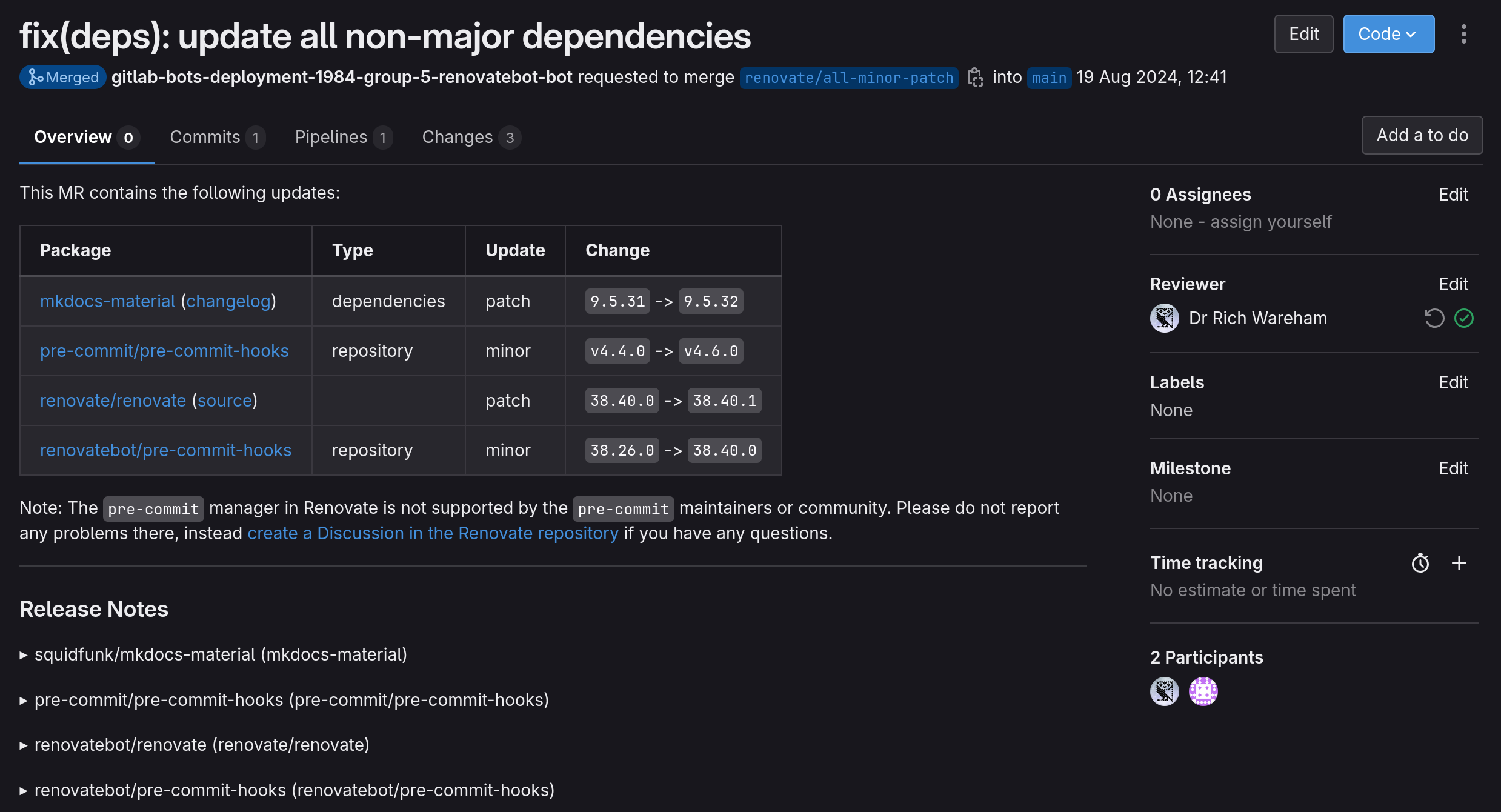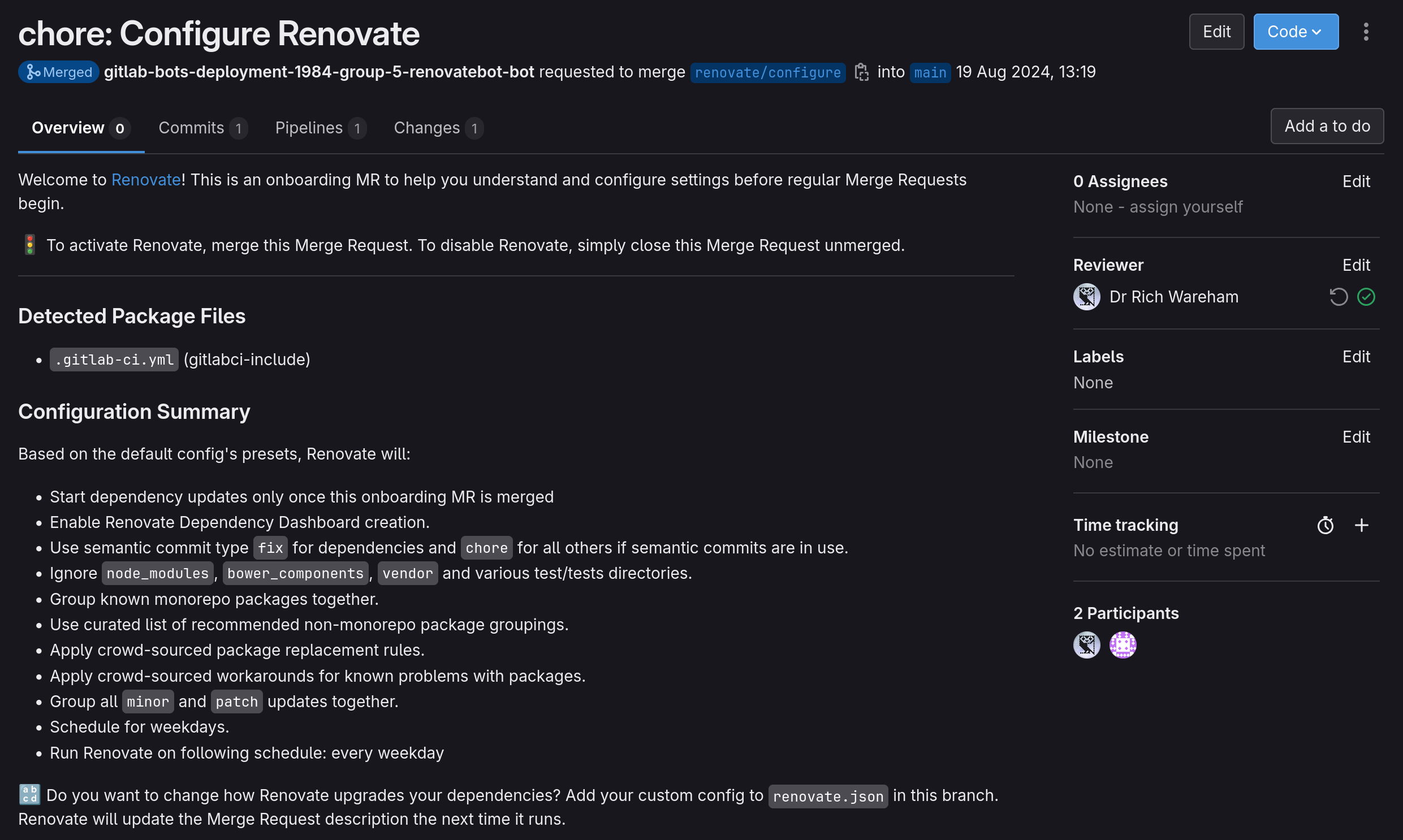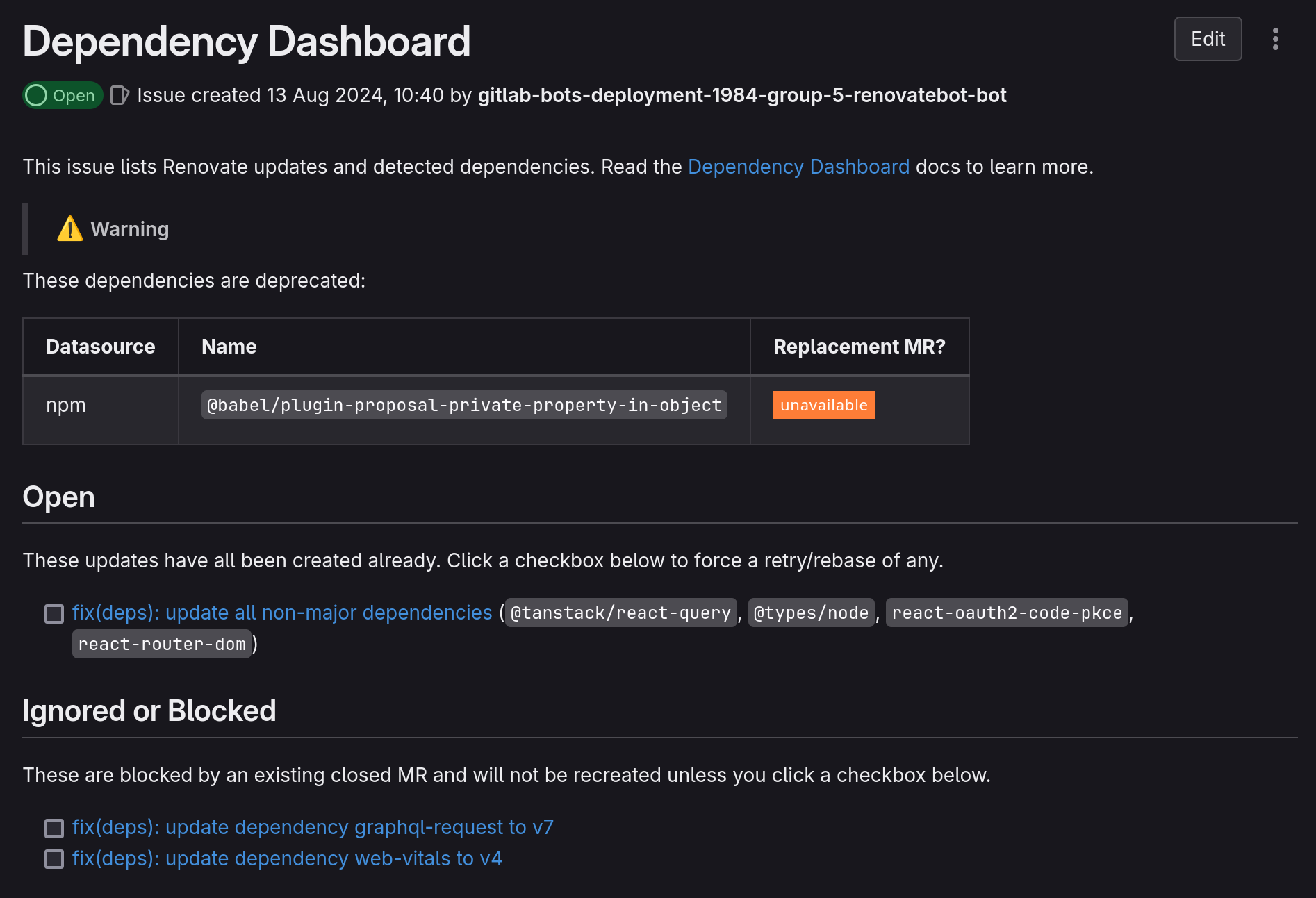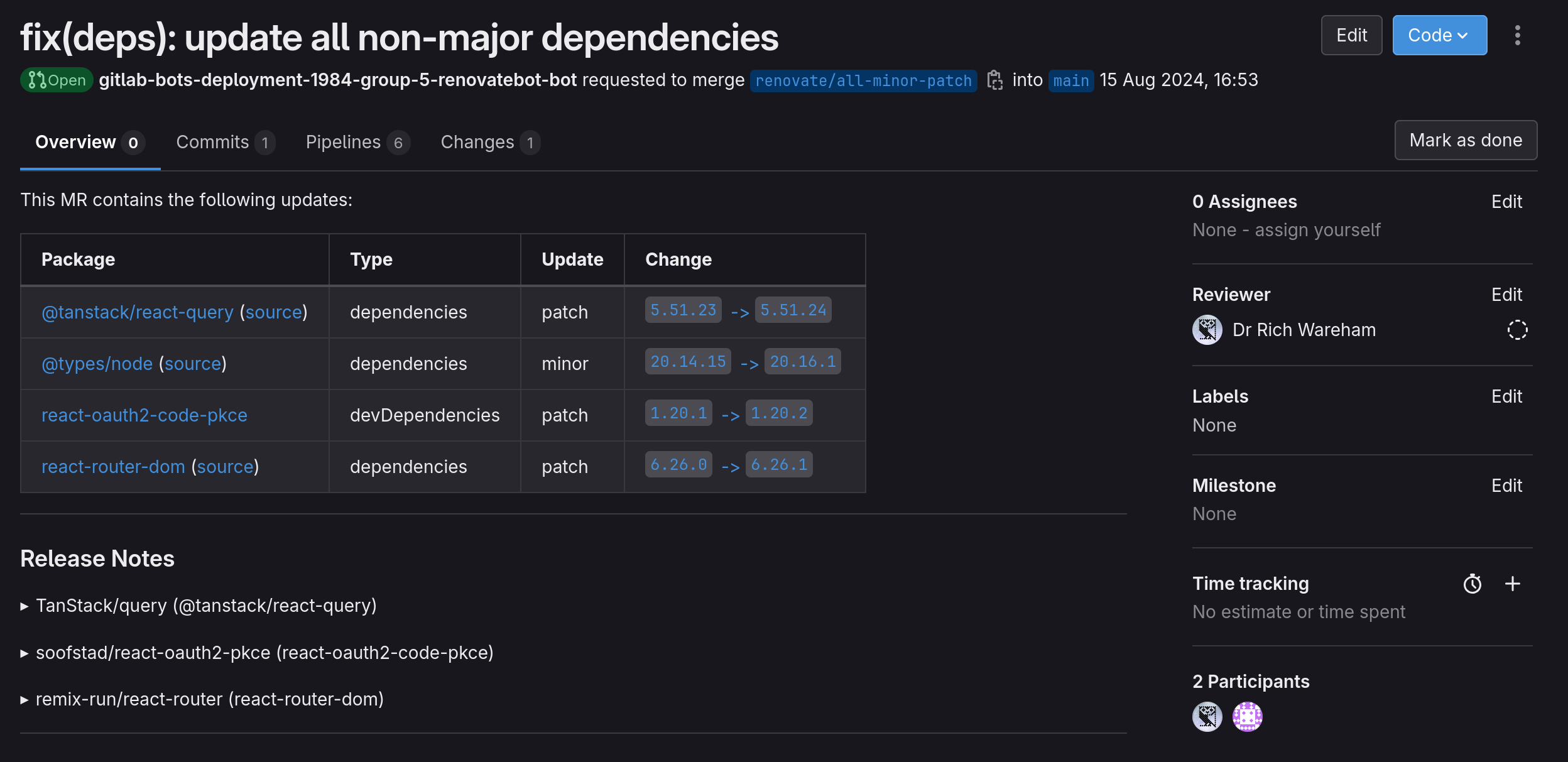Keeping dependencies fresh with renovatebot¶
Our GitLab projects tend to hard-code a lot of dependency versions. Maven, poetry and npm all support specifying which versions of dependencies need to be installed and terraform configurations depend on particular provider versions.
Keeping on top of these dependencies is a challenge. In particular it is a challenge to keep on top of dependencies which prove a security risk due to known vulnerabilities. We employ container and dependency scanning in GitLab CI which helps with awareness of vulnerabilities but it is still something of a chore to freshen dependencies when necessary. The exact scan schedule may change as the service evolves but will always comprise multiple runs per week. If you require an exact schedule, trigger renovatebot from a scheduled CI job.
Renovatebot is a piece of software which regularly scans projects in GitLab and maintains Merge Requests (MRs) which freshen dependencies.

An example MR maintained by renovatebot.
The renovatebot documentation has a more information on how renovatebot works.
More than just packages¶
While renovatebot can keep dependencies from maven, poetry and npm up-to-date that is not the limit of its abilities. Some other features which are of use to DevOps:
- Automatically applying updates from our webapp and GCP deployment boilerplate template repositories. (Example MR)
- Keeping pre-commit hooks fresh. (Example MR)
- Making sure that we're always using the most recent version of our CI templates. (Example MR)
- Creating MRs for deployment projects when a new version of a docker image is available. (Example MR)
- Freshening terraform providers. (Example MR)
The renovatebot workflow¶
Onboarding¶
Renovatebot will create an "onboarding" Merge Request in each project (example).

An example "on-boarding" Merge Request created by renovatebot.
This on-boarding MR will list the dependencies renovatebot has found in your project and a preview of what it intends to do. If this all looks good, merge the MR to start getting renovatebot updates.
Configuration¶
The on-boarding MR will create a renovate.json configuration file for renovatebot. The default
configuration references our default
configuration:
{
"$schema": "https://docs.renovatebot.com/renovate-schema.json",
"extends": [
"local>uis/devops/renovate-config"
]
}
Renovatebot is very configurable and configuration can be set per-project in the renovate.json
file.
You may find that you end up adding the same configuration to multiple places. Renovatebot has a mechanism called "presets" which can help with this.
See also
Renovatebot's documentation has a longer discussion of presets.
For example, some teams may prefer to have renovatebot run on Sundays so that MRs are ready to review on Mondays. The default configuration has renovatebot run on week days but the renovate-config project also provides a "preset" configuration snippet called scheduleSundays. Projects can "extend" their default renovatebot config to make use of that preset:
{
"$schema": "https://docs.renovatebot.com/renovate-schema.json",
"extends": [
"local>uis/devops/renovate-config",
"local>uis/devops/renovate-config:scheduleSundays"
]
}
You can host your own presets in GitLab and share them with all your projects.
The dependency dashboard¶
Renovatebot will maintain a "dependency dashboard" issue which you can bookmark (example).
The dashboard will give you an overview of which dependencies renovatebot has detected in your project and any open MRs still needing attention.
Each MR has a tick box next to it. Ticking the box will cause renovatebot to attempt to update and rebase that MR when it next runs.
See also
The renovatebot documentation has a longer discussion of the dependency dashboard.

An example dependency dashboard issue.
Freshening MRs¶
Renovatebot maintains a number of "freshening" MRs (example) which update dependencies. Our default configuration will group all the non-minor dependency updates together into a single MR abut keep major dependency upgrade MRs separate.

An example MR updating all the non-major dependencies in a project.
The MR will, when possible, include changelog summaries for each package freshened so that you can see what's changed.
Tips-and-tricks¶
This section covers some general tips-and-tricks for renovatebot.
Assigning reviewers automatically¶
Renovatebot can auto-assign reviewers to the MRs it creates if you make use of a CODEOWNERS file.
There are some limitations in renovatebot's support for this. See the how to
guide for more information.
Follow the dashboard issue¶
If you don't want to auto-assign reviewers to MRs, you can instead have the potential field of reviewers enable notifications for the dependency dashboard issue. Then they will be notified when renovatebot has created or updated freshening MRs.
Per-manager configuration¶
Renovatebot has the concept of managers which cover the different package managers renovatebot knows about. It is sometimes convenient to have configuration be scoped to a particular manager. This is done by putting the configuration into a section named after the manager.
For example, to customise the names of the requirements.txt files which the Python package
manager looks for, add the following to renovate.json:
{
// ... other config ...
"pip_requirements": {
"fileMatch": [
"^specially-named-requirements\\.txt$"
]
}
}
Pre-commit¶
Renovatebot can freshen hooks from pre-commit configurations but this support is currently in beta and you must explicitly opt-in.
Copier¶
Renovatebot can try to update webapp and boilerplate configurations which make use of our copier
templates. In order to do this the _src_path must
be of the form https://gitlab.developers.cam.ac.uk/....
This can make it difficult when using private templates, such as the GCP deployment boilerplate, and
running copier locally. The following command will tell git to use SSH when cloning https://...
URLs for GitLab:
git config set --global \
url."git@gitlab.developers.cam.ac.uk:".insteadOf https://gitlab.developers.cam.ac.uk/
More documentation¶
The following how-to guides cover specifics of configuring renovatebot: